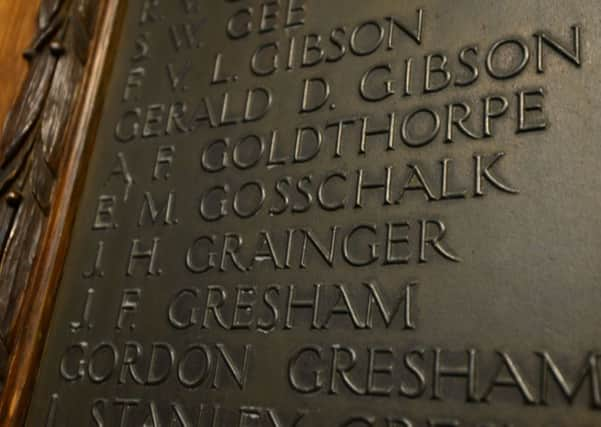Remembering Jewish soldiers in the war


EDWARD Myer Gosschalk was just like the tens of thousands of men from across Yorkshire who rushed to sign up when war broke out in 1914. What makes his story different is that he was 30 years old and Jewish.
By the early part of the 20th century Britain was home to a sizeable and growing Jewish population and the war gave them the opportunity to prove they not only had a head for business, but were committed citizens who were prepared to do their bit for king and country.
Advertisement
Hide AdAdvertisement
Hide AdLeeds, Sheffield and Hull were home to the biggest Jewish communities in Yorkshire but they were also in places like Huddersfield and Bradford as well as seaside resorts such as Bridlington and Hornsea. They had, in other words, become part of the fabric of society and, as such, they were expected to lead by example.
The Gosschalks were a prosperous family that emigrated to Hull from Holland in the late 19th century. Edward’s father was a former Sheriff of the city and he himself was a pillar of the community and a partner in Dumoulin and Gosschalk, a firm of merchants and importers.
He was one of six children and was educated at Hymers College, an independent school in the city, where today his name is among those inscribed on a memorial to the former pupils who lost their lives in the war.
Dr Nick Evans, a lecturer in Diaspora History at the University of Hull, says Gosschalk joined the 6th Battalion, The King’s Own (Yorkshire Light Infantry). “What we have is a man who enlists in the Army before conscription and his family are involved in enlisting other men from across the region, including those who were not Jewish. They were leading by example and at the same time showing their assimilation into British life, so this is an important part of the Yorkshire-Jewish story.”
Advertisement
Hide AdAdvertisement
Hide AdGosschalk, who became a lieutenant, saw action in a matter of weeks. “He was injured and came home to Hull to recover before he went back again. But what’s interesting is that while he was convalescing he actively went off and helped others to join the fight,” says Dr Evans. Two of his brothers also joined the Army. One was a major who served on the front line and later became a recruiting officer in Bridlington, while another was a captain in the East Yorkshires who was invalided home with shell shock and went to work for the Territorial Force Association in Hull.
More than 3,000 Jewish men from Leeds alone served in the armed forces and many Jews from Yorkshire who enlisted joined local regiments such as The Prince of Wales’s Own (West Yorkshire Regiment), the East Yorkshire Regiment and The King’s Own (Yorkshire Light Infantry). “What’s important about this is there was no Jewish regiment at the time so they were fighting alongside non-Jews in the British Army.”
Although his brothers survived, Gosschalk’s war came to an end on August 28, 1916, when he was killed at Deville Wood during the Somme Offensive. In a sermon in his memory, he was described as an “earnest and lovable gentleman, who at the call of duty gave up all to fight for his country”.
However, while the likes of Gosschalk heeded the nation’s call to action, for many Jews in Britain who still had relatives living in countries across Europe, including Germany and Russia, the war caused them to question their own identity. “The main problem for Jews on the eve of the First World War was that many of them had migrated to Britain to avoid compulsory military conscription in the Russian Imperial Army. This doesn’t mean they were shirking their duties, but unlike non-Jews in Russia a Jew that enlisted could serve for 25 years, so it was almost like a death sentence.”
Advertisement
Hide AdAdvertisement
Hide AdBy moving to Britain they avoided this but when war broke out they found themselves on the horns of a dilemma. “They were faced with the possibility of fighting against their relatives as well as members of their own religion, so it was a very divisive time for Jews. Because if you didn’t fight you could be accused of shirking your duty and not showing respect to your new country, Britain. But what you see is Jews from across Britain, India, Australia, New Zealand, South Africa and Canada enlisting as part of this imperial force.”
Many of the Jews that enlisted initially were from the officer class, but for others it wasn’t such a clear decision. “For those of Eastern European immigrant origin, in particular, their problem was if they went off to fight, who was going to provide food and shelter for their families? But if you didn’t enlist the danger was you were seen as a military age alien who wasn’t willing to fight, which meant some people might start to question whether you had something to hide.”
In Britain, though, there was little anti-Semitism. “There were the odd pockets but it wasn’t widespread. I think the contribution of Jews to the war effort both at home and abroad sufficiently negated that.”
Dr Evans believes the story of Yorkshire’s Jewish soldiers in the Great War has deeper roots than many us perhaps realise. “When we look at our war memorials we should perhaps remember that there is a much greater mosaic of ethnicities and nationalities than we assume.
Advertisement
Hide AdAdvertisement
Hide Ad“Whether the memorials are in public spaces, or in synagogues, or in schools like Hymers College, have a look more carefully at these names because it isn’t just about the individuals, it’s about their ethnicities, too, and what this tells us about what was happening at the time.”